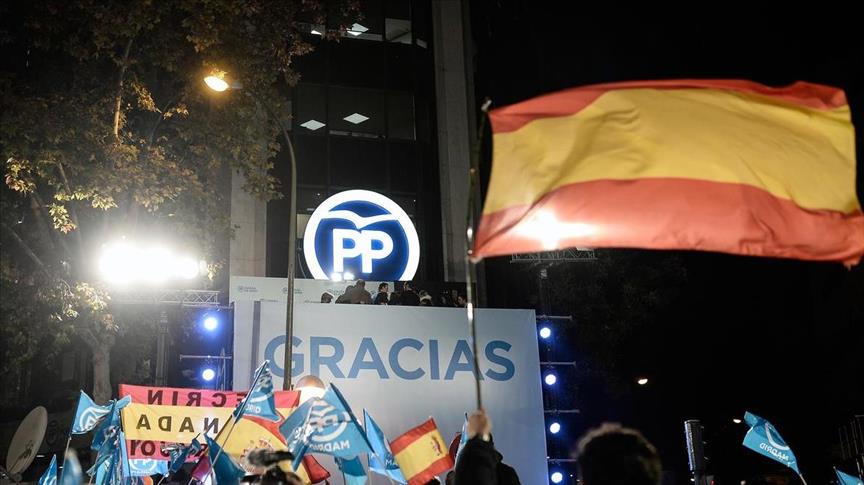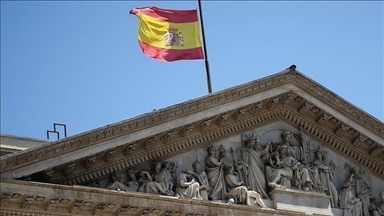
Ankara
By Alyssa McMurtry
MADRID
Corruption scandals are taking a toll on Spain’s ruling Popular Party with some now even questioning its ability to govern the country.
Esperanza Aguirre, a major Spanish political figure, announced her resignation as president of Madrid’s Popular Party (PP) late Sunday in the aftermath of a corruption raid.
"Corruption is killing us," Aguirre said, three days after the police raided the Madrid branch of her party in search of evidence for illegal political financing.
The raid was related to the same case that sent Aguirre’s former right hand man, Francisco Granados, to prison for his involvement in an alleged criminal political network.
The network is accused of siphoning off illegal commissions between two and three percent of around €250 million ($280 million) worth of public contracts to corrupt politicians through cooperating business people in Madrid and other Spanish regions.
Aguirre, however, is only the latest political casualty in a series of scandals that has rocked Spain’s ruling PP party.
In late January, Spanish police arrested 24 people, many linked to the conservative PP, in an anti-corruption raid investigating a similar network, which charged illegal commissions for granting public contracts in the eastern region of Valencia. The court is investigating various crimes, including breach of public duties, embezzlement of public funds, influence peddling, bribery and money laundering.
A few PP politicians are also sitting alongside Spanish King Felipe VI’s sister, Princess Cristina, in a historical trial where royalty, politicians and business people are accused of collaborating in a network accused of funneling off around €6.2 million ($6.7 million) of public funds into private accounts.
The Popular Party even made history in January by becoming Spain’s first political party to be officially placed under investigation for its suspected role in destroying evidence on computers and hard disks related to the Barcenas corruption case. In the case, a judge found that the PP had secretly run a slush fund with millions of euros in offshore accounts, which was allegedly used to enrich politicians.
The list goes on and on. Local Spanish media reported that approximately 340 people linked to the PP are under investigation in Spain for corruption in 30 different corruption rings.
Members of other political parties, including the Socialist Party (PSOE), which is the only other party to have governed Spain, have also been accused and convicted.
The PP is currently in a precarious position in its bid to govern Spain and the barrage of new corruption scandals in the public eye is not helping it, analysts say. Although they did win the elections in December, they lost their majority government in exchange for a minority government and have not been able to form a coalition government that would give them the necessary parliamentary majority."Rajoy doesn’t have credibility. He can’t head the fight against corruption," said Albert Rivera, leader of the newly-formed Ciudadanos (Citizens) Party, during an interview with Spanish broadcaster, Antena 3, on Friday.
Spain’s December elections had brought down the traditional bipartisan system in Spain. The two traditional parties, the PP and the Socialists, lost their seats to Ciudadanos and to the left-wing Podemos. Both parties presented themselves as non-corrupt alternatives to the traditional parties which have both been linked to major corruption scandals.
In December’s election, the vote was split between the four parties, leading to a fragmented parliament with no obvious coalition in sight. Earlier this February, after Rajoy rejected the king’s request to lead the first round of coalition talks, the monarch asked the leader of the Socialist Party, Pedro Sanchez, to try to form a government.
Rajoy has not given up however, and has made clear that he will present his candidacy if Sanchez fails.
So far, Sanchez has had limited negotiations with Rajoy in tense meetings in what Spanish pundits call a new "cold war" between the two traditional parties. A major trigger for these chilly relations happened during a debate before the elections, when Sanchez called Rajoy "indecent" for his party’s involvement in corruption.
"To fight corruption the important thing is that whoever is elected, the Spanish politicians have to be conscious of the corruption in this country and make agreements, laws and enforce anti-corruption measures including cleaning their parties of corrupt members," Jesus Lizcano, president of Transparency International Spain and professor at the Autonomous University of Madrid, told the Anadolu Agency.
On Monday, it was announced that the first non-confidence vote for Pedro Sanchez as the new prime minister will be held March 3. From then on, the electoral clock starts ticking and if no government can be decided upon within two month, new elections will be forced for June 26.
According to a recently released Transparency International report, Spain is ranked 36 globally in the Corruptions Perceptions Index, down two points from last year.
In Western Europe, Spain is perceived to be the second most corrupt country, trailing only behind Italy. Spain’s 2015 corruption perception index was the country’s poorest ranking in two decades and has fallen 16 places since it was ranked 20th in 2002.
"In Spain, the corruption is fundamentally political, it centers around people in the government collaborating with complicit businesses, who bribe and pay commissions; there’s no mafia like there is in Italy," Lizcano said in an interview.
However, Lizcano pointed out that although the perception of corruption may be at an all-time high in Spain, at least now people are aware of it and politicians are facing consequences.
"Spain is perhaps actually on a good path now with corruption, with the courts, new laws and the police all cracking down. It’s possible that today corruption is less than it was in the past, but with all these cases coming to light, there’s alarm in the public and much of the Spanish society is outraged," he said.
Anadolu Agency website contains only a portion of the news stories offered to subscribers in the AA News Broadcasting System (HAS), and in summarized form. Please contact us for subscription options.







